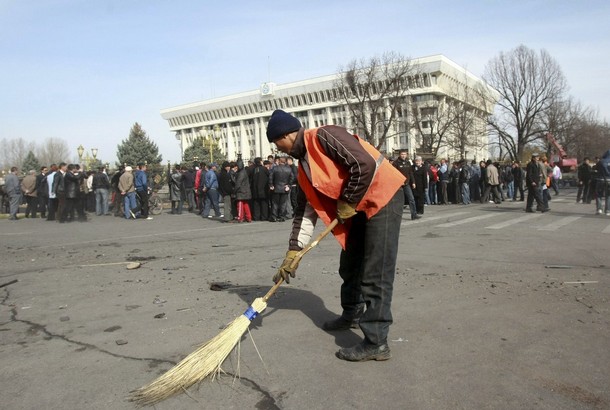
In 2005, Askar Akayev, the then-President of Kyrgyzstan, was deposed and fled from the capital, Bishkek, to Moscow to save his life and the millions of dollars he allegedly stole from the country during his presidency.
The driver of change was none other than Kurmanbek Bakiev, riding into the capital on horseback from Osh, a city near the Tajik border. He was flanked by an angry mob sick of corruption, poverty and Akayev’s greed.
A change was in the making in Kyrgyzstan, or so we thought. The pundits quickly dubbed what happened in 2005 the Tulip Revolution. Only it wasn’t a revolution, and those who anticipated change in Kyrgyzstan got it all wrong.
When Bakiev took over as president in 2005, after winning the election organized and overseen by the world’s biggest regional security organization, the Organization for Security and Co-operation in Europe (OSCE), he swore to fight corruption and redistribute power, giving more clout to the parliament.
Five years on, he did none of what he promised, and he didn’t have to. Soon after the crisis in 2005, the internationals quickly turned their attention to other business in the region, and began dealing with Bakiev largely through the narrow prism of the war in Afghanistan.
For the Americans, the base at Manas became a key in the military supply chain for combat operations in Afghanistan. The Bush administration was so desperate for access that they agreed to high rent fees and shady contracts with no real transparency.
This set the precedent for Bakiev; he could do whatever he wanted. So long as he had the U.S. troops using his base, he was protected and there would be no questions asked.
Bahiev started grabbing a bigger stake in the Kyrgyz economy through shadow companies set up by his son, allegedly lining his pockets with American rent money and taking even more power away from the parliament. Already in 2005, the Kyrgyz parliament lacked a real political culture, purpose and a role in the policymaking arena. Things have gotten worse since then.
What happened in the past few days in Kyrgyzstan is exactly what happened in 2005 — the government folded much more quickly than expected.
But the opposition, which lacks a coherent governing strategy, is not ready to lead. Bakiev is not coming back, so the first priority for the international community is to help the opposition put together an interim government to fill the political vacuum.
This interim solution must endure long enough to give OSCE a chance to organize early parliamentary and presidential elections.
After the election and the creation of a new government, the priority should be on achieving transparency. The international community through OSCE needs to make sure that the next government will embrace transparency, making its commitments irreversible.
This above all means that the U.S. should be willing to walk away from the Manas base deal.
To foster the perception in Kyrgyzstan that the U.S. has an alternative to Manas should help Washington negotiate a better and more transparent deal with the new Kyrgyz government. Under this scenario, Washington can set the terms of the negotiation.
Another priority is to build up the parliament’s capability, helping the legislators find a voice and play an effective role in the decision-making process of the country.
Without a stronger parliament, the next president will be in the same position that Bakiev found himself after taking office in 2005, virtually unopposed. From there it is easy to turn the presidency into an office for personal enrichment.
Finally, what must be avoided is the mistake made in 2005 when we assumed that we were dealing with a revolution.
Kyrgyzstan didn’t have one then, and this is not one now. Instead, the events that unfolded produced an unintended consequence and put into power a set of actors who don’t necessarily understand, nor share, the principles of open, democratic and liberal governance.
The international community needs to work with them closely on these fundamental values if the next five years are to be more stable and prosperous for the country than the past five have been.
Borut Grgic, a nonresident senior fellow at the Atlantic Council, is the founder and chairman of the Institute for Strategic Studies in Brussels, a nongovernmental institution focused on the EU’s foreign policy. He is a former adviser to the president and the minister of foreign affairs of Slovenia, which held the chairmanship of the OSCE during the 2005 Kyrgyzstan crisis, and to the Kosovo Prime Minister. This essay was co-published with CNN. Photo credit: Reuters Pictures.
Image: Kyrgyzstan-Democracy-Sweep.jpg
